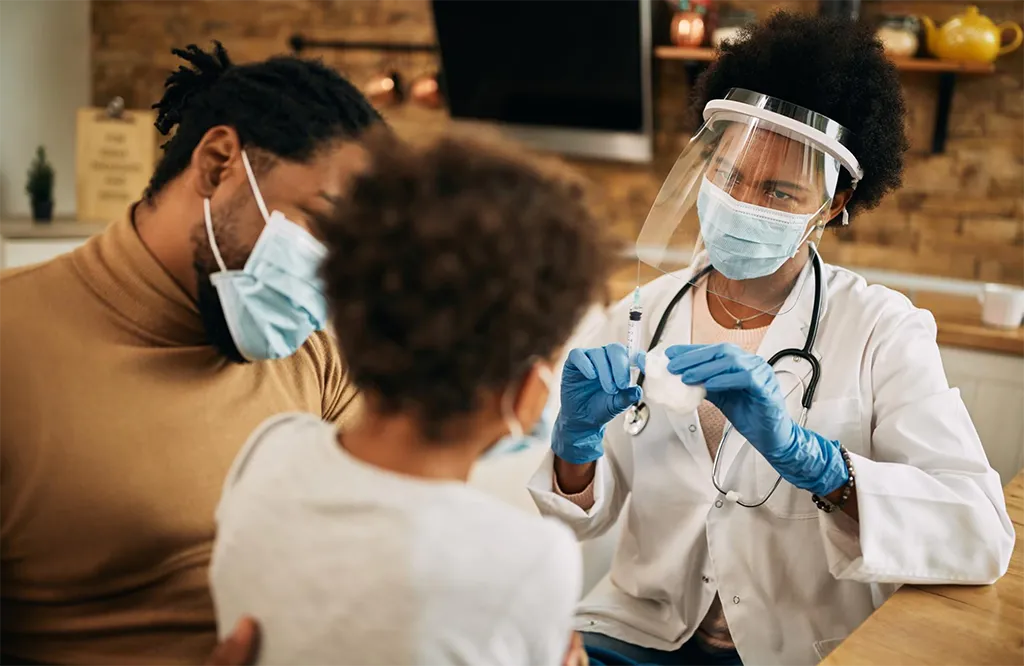Learn More About Vaccine Research Studies
What are Vaccine Research Studies?

Vaccines activate the immune system by using weakened or inactive parts of an antigen. This allows the vaccines to prevent dangerous diseases without making the patient sicker. The latest vaccine research studies are centered around genetic engineering to make antigens. Regardless of the vaccine’s route to fight the infectious disease, the antigen does not cause further disease in the patient.
Over time, the immune system ‘remembers’ the disease and ensures that the body does not get sick through the same microbe again. The primary aim of vaccines is to help the body obtain this immunity without having to go through the risks of having a disease. In other words, vaccinations help create a ‘memory’ in the immune system so the body can protect itself.
Why is Vaccine Being Studied Through Clinical Trials?
Vaccines reportedly prevented 3.5 to 5 million deaths yearly from several diseases, such as measles, influenza, and tetanus. Two major diseases, rinderpest and smallpox, have been almost eliminated. Vaccine research is essential because it helps prevent infectious diseases in patients at an early age and has dramatically improved their quality of life.
However, more clinical trials and research are needed to make vaccines more effective. Over 6 million people still die every year due to complications from infections caused by diarrhoea and pneumonia, which vaccines can prevent. Most clinical trials are currently focused on rotavirus and pneumococcal conjugate vaccines, which can further reduce mortality at an early age.
Some of the more complex infections, such as HIV and tuberculosis, may be tackled with the help of combination vaccines that stimulate a different aspect of the immune system. In the long run, vaccine clinical trials can also help improve several non-infectious diseases. Recent innovations in therapeutic vaccines have improved care outcomes in many cancer patients. Scientists are researching how vaccines can help with diabetes, hypertension, Alzheimer’s disease, and addiction.
How Does Vaccine Treatment Work?

Patients may be prescribed vaccine treatment depending on their specific set of ailments. Vaccines help treat both infectious and noninfectious diseases. They work by stimulating the immune response to attack the virus. This creates immunological memory after exposure to the potentially dangerous antigen.
Most vaccines contain a weakened form of a virus that triggers a response from the immune system but does not cause any disease. Vaccines also activate the T-cells and B-cells throughout the bone marrow and the body. In the future, when the person encounters the same virus, their body can mount an effective defense against it.
Vaccines can also prevent and treat cancer. The FDA has approved two HPV and Hepatitis B that can cause cancer. HPV vaccines protect against the human papillomavirus, which can cause certain types of cancer if allowed to stay in the body for a long time, including vaginal and anal cancers.
Hepatitis vaccines can protect against the hepatitis B virus, which can later cause liver cancer. Most cancer vaccines are only administered through clinical trials on volunteers.
What Are Some of the Breakthrough Clinical Trials Involving Vaccines?
Vaccine research studies are rapidly evolving, providing researchers and doctors with new insights into preventing and treating several diseases and infections. Researchers are looking for vaccines for many types of acne, including bladder cancer, breast cancer, brain tumors, cervical cancer, kidney cancer, and leukaemia.
Below is a list of major breakthroughs in vaccine research studies.
2014: Effective Messages in Vaccine Promotion - This randomized controlled trial investigated the effectiveness of messages to increase vaccination rates (as well as tackling vaccine misperceptions) for measles mumps rubella (MMR). The survey had 1759 parents over 18 years old who had children in their household under the age of 17. Volunteers were randomly assigned to receive one of four interventions.
The interventions investigated whether vaccine messaging could improve parental intent to vaccinate children. Although the messages successfully tackled the misconception that vaccines cause autism, they didn’t increase intent to vaccinate children. This study shows that current public health communication efforts about vaccines are not impacting many US households. Attempts to alleviate any concerns about vaccines may be counterintuitive.
2014: Vaccine for Cocaine Dependence - This clinical study investigated the efficacy, safety profile, and immunogenicity of succinyl norcocaine conjugated to cholera toxin B protein as a potential vaccine for cocaine dependence. Researchers measured urine cocaine metabolized three times per week as their primary outcome. 300 participants had smoked cocaine for an average of 13 days every month.
It was hypothesized that retention might be better and positive for subjects with high lgG anti-cocaine levels. This was attained by 67% of the subjects that received five vaccinations. The vaccinated group attained abstinence for at least two weeks for the trial, and the high lgG group had the most cocaine-free urine of all participants. However, the results obtained were not significant. The vaccine was found safe but did lead to satisfactory levels of abstinence in patients.
2018: Increasing Influenza Vaccine Uptake in Children - This randomized study in Hong Kong investigated if an intervention package can increase influenza vaccine in children. 833 mother-baby pairs were included in the study from two study samples. The groups received publicly available leaflets about using subsidized vaccines through the private sector using the Vaccination Subsidy Scheme (VSS).
Intervention groups also received concise information about influenza and its vaccine and other crucial information. It was found that mothers' attitudes toward the influenza vaccine improved by about 22% at age one and 25% at age 2 of their infants. It was concluded that an effectively designed intervention package could improve the influenza vaccine uptake in Hong Kong children.
2021: Safety and Immunogenicity of Conjugate Vaccine - This randomized trial investigated the safety and immunogenicity of a 20 valent pneumococcal conjugate vaccine (PCV20) in adult participants over the age of 64. The study was conducted in Sweden and the United States. Participants were randomized within their cohort to receive a dose of PCV20 or PCV13 if they had PPSV23 and PCV20 and PPSV23 if they had PCV 13. All participants with PPSV23 and PCV13 received PCV 20.
It was found that the number of participants reporting any systemic events and local reactions after PCV20 administration was comparable with the PCV13 and PPSV23 control groups. The newly diagnosed chronic medical conditions (NDCMC) and serious adverse effect (SAE) rates were low in all groups. It was concluded that PCV20 was well tolerated.
2021: Effect of Written Vaccination Information on COVID-19 Vaccine Hesitancy - This randomized controlled trial investigated the effectiveness of written information about COVID-19 vaccinations on adults with vaccine hesitancy in the UK. The test aims to see which type of inwritten information is adequate. Over 15,000 adults were recruited in the UK who were randomly assigned across ten information conditions. The information was obtained from the National Health Service website and other sources.
Participants were then required to complete the Oxford COVID-19 Vaccine Hesitancy Scale with a score ranging from 7 to 35. It was found that vaccine hesitancy had reduced from 26.9% to 16.9% in one year. 66.1% of the participants were classified as willing, 15.5% as doubtful, and 18.4% as strongly hesitant. It was also determined that vaccine hesitancy could be significantly reduced by emphasizing personal benefits rather than collective benefits.
2021: Results of MenACWY-CRM Conjugate Vaccine - A fully liquid formulation of MenACWY-CRM has been developed to improve vaccine presentation. This study aimed to investigate the safety and immunogenicity of the liquid vaccine with the licensed version (which consists of two vials that are reconstituted before the injection). The randomized controlled trial observed 979 healthy adults who received a single dose of the fully liquid dose of MenACWY-CRM or the licensed MenACWY-CRM vaccine.
It was found that the immune responses against various serogroups are similar across the two vaccine groups and non-inferior for MenA. The liquid presentation greatly accelerated MenA free saccharide generation to 30)%. It was found that the levels of MenA free saccharide had no bearing on the immunogenicity of the full liquid presentation. In other words, both vaccines' safety profiles, reactogenicity, and immunogenicity appeared to be similar.
Who Are The Key Opinion Leaders On Vaccine Clinical Trial Research?
The Center for Vaccine Development and Global Health (CVD) at the University of Maryland has contributed to vaccine research for over 40 years domestically and internationally. Their primary goal is to deploy vaccines to serve the world’s underserved societies. The research is focused on developing novel vaccines for various illnesses, including autoimmune diseases, cancers, and other conditions.
Center for Vaccine Research at the University of Pittsburgh has played a major role in advancing the diagnosis and treatment of many infectious diseases that have puzzled scientists for years. Their research center is one of the leading research institutions in the country and leverages the University’s strengths in immunology and virology, with a specific focus on HIV and other infections. The institution focuses on the molecular mechanisms of infectious diseases to help with the development of novel vaccines.
Vaccine Center Research at New York University uses state-of-the-art methods to produce new vaccines to deliver painless and effective treatment. The institution's active COVID-19 vaccine and treatment research program played an important role in fighting against the infection. In addition, the institution is focused on developing effective vaccines to fight infectious diseases such as HIV, malaria, and tuberculosis.
Kathleen M. Neuzil, MD, MPH, FIDSA, is a professor in Vaccinology and Director at the Center for Vaccine Development and Global Health at the University of Maryland. She is a leading researcher in vaccinology, has conducted many clinical studies on vaccine-preventable diseases, and has published high-profile papers on the same. Her work has spanned several vaccines that tackle HPV, typhoid, rotavirus, influenza, and COVID-19, among others. Neuzil is a member of the WHO advisory group of experts on immunization.